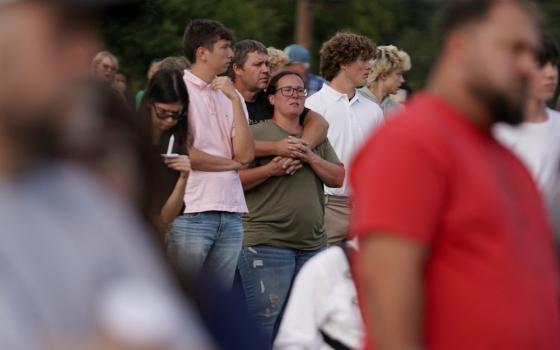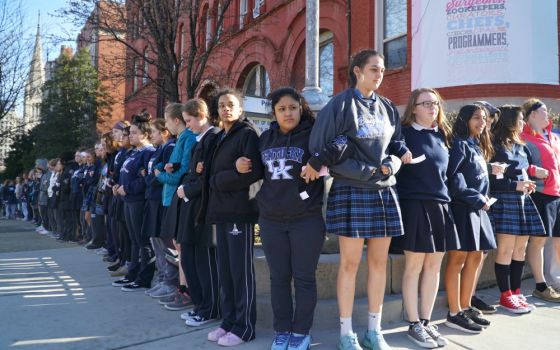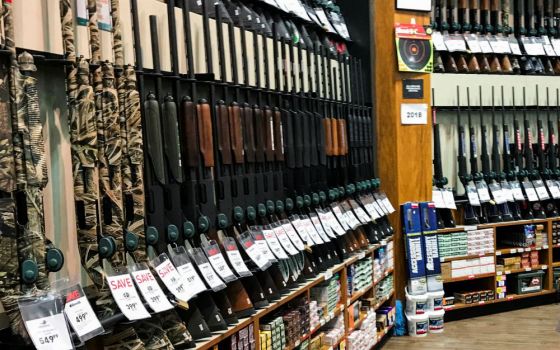Editor's Note: The following is the editorial from the Aug. 14-27, 2015, NCR. It's message is even more relevant today after the mass shooting at Umpqua Community College, Roseburg, Oregon, Oct. 1. It matches the call by President Obama when he said tonight: "I’d ask the American people to think about how they can get our government to change these laws. ... If you think this is a problem, then you should expect your elected officials to reflect your views. ... we're going to have to change our laws. And this is not something I can do by myself. I've got to have a Congress and I've got to have state legislatures and governors who are willing to work with me on this."
The Second Amendment is not in jeopardy. It is not going to be revoked or altered.
The right to bear arms, as awkwardly as it might be expressed in that amendment amid what appear rather limiting qualifiers (aren't we already paying for a well-ordered militia?), will not be abridged. No one is going to take away anyone's guns.
With that stipulation in place, might it be possible to have a discussion that would be considered reasonable and compelling were the number of dead caused by any means other than guns? Is it possible to take stock of the handgun killings in the United States and at least agree that, if for no other reason than that the number is by far greater than it is anywhere else in the developed world, we should be looking for ways to reduce the killing?
Faiths United to Prevent Gun Violence, a coalition of more than 50 national faith groups and organizations, is on the right track in its attempt to wrest the discussion of gun violence from the simplistic and fatal grip of the National Rifle Association (see story). Not only does it have a good argument, it has good evidence showing the decrease in violent crimes in jurisdictions that have put sane gun control laws in place and an increase in violence in those places that have reversed such sane measures as background checks.
The national conversation about gun violence for too long has been fixed at two disparate points: outrage and helplessness. The outrage is evident most often after mass killings such as those recently at a military base, a historically black church, and a movie theater.
The website shootingtracker.com, a crowdsourced listing of mass shootings, takes an interestingly different look at mass gun violence. It counts not just the shootings in which multiple people were killed, but those in which four or more people were shot, and it has determined, using that calculus, that by Aug. 3, the 215th day of 2015, there had been 217 mass shootings in the United States, more than one a day.
The pattern, however, is that after the rage, numbness sets in. Even the horrific slaughter of schoolchildren in Newtown, Conn., in December 2012 was unable to move federal legislators to enact what the public widely perceived as reasonable mandatory background checks. In the face of NRA money and fear-mongering, the country seems powerless.
While mass shootings grab headlines, they account for only 1 percent of gun-related violence in the United States. The vast majority of deaths -- more than 11,000 in 2011 alone -- are individuals killed by handguns.
In a recent Washington Post column, Fareed Zakaria draws a telling comparison. Since 9/11, 74 people have been killed in the United States by terrorists while the country, during that time, has invaded two countries, conducted military operations in many others, and spent more than $800 billion on homeland security. Over the same years, more than 150,000 Americans, the equivalent of "almost three Vietnams," have been killed in gun homicides.
Related: But guns make us safer, right?
Franciscan Sr. Marie Lucey of the Franciscan Action Network puts her finger on it. Background checks and handgun licensing are not threats to constitutional rights. They would, instead, balance out the individual right to own a gun with the equally important rights of the larger community to be safe from the random and increasingly frequent deadly force plaguing our cities.
The matter is a very real concern and was the cause of an Aug. 4 summit of police officials from a number of jurisdictions across the country who are agonized by the growing number of homicides, mostly by handguns, in their cities. The law enforcement officials noted that the proliferation of firearms was high on the list of problems facing major cities.
According to a report in the Post, one police chief described "going to shooting scenes now where you've got more and more victims being shot, you've got more spent rounds being collected as evidence, and we're finding more and more high-capacity magazines involved in those shootings."
The police at the summit recommend tougher gun laws and harsher sentences for gun law violations and for the use of high-capacity magazines.
Perhaps the problem had to reach epidemic proportions. Perhaps some of our streets had to begin to resemble the war zones on news feeds from what we would describe as lawless countries in some other part of the world, before the national conversation could move forward. The harsh reality is that sections of our cities are becoming lawless and deadly places for too many.
It is time to take action and get behind Faiths United's common-sense agenda. Write or call your federal legislator and insist that Congress enact laws that:
- Require every gun buyer to pass a criminal background check;
- Take military-style assault weapons and high-capacity magazines off the streets;
- Make gun trafficking a federal crime.
Being the world's leader in the number of deaths by handguns reflects badly on the vaunted "freedom" that enables such carnage. It's time to change the conversation and the law.



